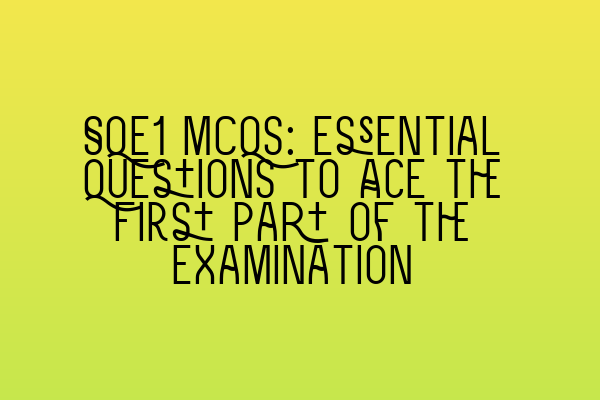The Solicitors Qualifying Examination (SQE) has become the new standardized assessment for aspiring solicitors in England and Wales. The SQE is divided into two parts – SQE1 and SQE2. In this blog post, we will focus on SQE1 and specifically explore essential multiple-choice questions (MCQs) that every candidate should master to excel in this crucial examination.
SQE1 is the first part of the SQE assessment, which tests candidates on their knowledge of substantive and procedural law. MCQs form a significant portion of the SQE1 examination, making it vital for candidates to be well-prepared for this question format. MCQs demand a deep understanding of legal concepts, swift analytical skills, and the ability to select the correct answer from a range of options. Consequently, practicing and mastering essential MCQs is pivotal for success in SQE1.
Q1: Which element is necessary for the formation of a legally binding contract?
a) Consideration
b) Invitation to treat
c) Counter-offer
d) Invitation to negotiate
Q2: In the context of contract law, what does the term ‘force majeure’ mean?
a) A breach of contract
b) An unforeseen event or circumstance
c) An offer made by a party
d) A counter-offer made by a party
Q3: Which of the following describes a crime that requires both the actus reus and mens rea elements?
a) Strict liability offense
b) Inchoate offense
c) Summary offense
d) Indictable offense
Q4: What does the legal principle of ‘presumption of innocence’ mean in criminal law?
a) The defendant is automatically guilty until proven innocent
b) The prosecution must prove the defendant’s guilt beyond reasonable doubt
c) The defendant is presumed to be guilty if charged
d) The defendant has the burden of proof in criminal cases
Q5: What type of tort involves negligent conduct that causes harm or injury to another person?
a) Nuisance
b) Trespass
c) Defamation
d) Negligence
Q6: In the context of tort law, what is the purpose of awarding ‘damages’ to the claimant?
a) To punish the defendant for their wrongdoing
b) To compensate the claimant for their loss or injury
c) To deter others from committing similar wrongful acts
d) To grant the claimant an equitable remedy
Q7: Which of the following is an example of primary legal research material?
a) Law textbooks
b) Legal encyclopedias
c) Judicial precedents
d) Legal dictionaries
Q8: What is the purpose of the Doctrine of Precedent in the English legal system?
a) To create new laws
b) To interpret legislation
c) To provide a framework for legal research
d) To ensure consistency and predictability in court decisions
Practicing and revising essential MCQs is paramount for success in the SQE1 examination. Regularly testing your knowledge and familiarizing yourself with the question format will sharpen your analytical skills and improve your speed in selecting the correct answers. Additionally, revision enables you to identify areas of weakness and devote more time to strengthening your understanding of those topics.
Remember, the SQE1 examination demands comprehensive knowledge of a wide range of legal subjects, so it is crucial to cover all significant areas through targeted practice. Use various study resources, including textbooks, online quizzes, and mock exams, to hone your skills and knowledge effectively.
Mastering essential MCQs is a vital step towards acing the SQE1 examination. By focusing on key topics such as contract law, criminal law, tort law, and legal systems and research skills, you can build a strong foundation for success. Remember, practice is key, so dedicate sufficient time to revise, test yourself, and refine your knowledge and analytical abilities. With thorough preparation and strategic practice, you can confidently tackle the MCQs in the SQE1 examination and edge closer to realizing your goal of becoming a qualified solicitor in England and Wales.

Leave a Reply